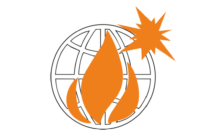The International Seminar on Fire and Explosion Hazards has become one of the important international events for fire and explosion engineering and science. The knowledge of technical aspects of fire and explosion hazards is the basis for safe design and operation of systems and structures and emergency response strategies in case of incidents or accidents. Understanding the physical effects that can cause harm is vital to reduce consequences and risk during incidents or accidents leading to fire and explosions. This knowledge is especially critical when new energy carriers are being introduced in to society. The ISFEH 10 conference is a place to share research on physical effects of hazards, prediction methods for consequences, applied safety analysis methods, mitigation methods, emergency response strategies, and many other topics.
ISFEH10 inherits well established traditions of past conferences in St. Petersburg, Russia (2019), Hefei, China (2016) , Providence, USA (2013), Leeds, UK (2010), Edinburgh, UK (2007), Londonderry, UK (2003), Lake Windermere, UK (2000), and Moscow, Russia (1995, 1997).
Submission Guidelines
The paper submission deadline is November 8. 2021. The call is for full papers. The papers will be peer reviewed and authors will get feedback before a final submission of papers.
The call for papers flyer can be downloaded here.
All papers will be peer reviewed and evaluated based on originality and quality of research, and relevance to the conference. All papers must be original and not simultaneously submitted to another journal or conference. The following paper categories are welcome:
- Full papers
- Work-in-progress Posters
Full papers and poster abstracts can be submitted through EasyChair through this link.
Full paper template with instructions can be downloaded here.
Poster abstract template with instructions can be downloaded here.
Important dates:
10th January 2022 | Full draft paper submission
7th March 2022 | Feedback from reviewers and acceptance of paper
4th April 2022 | Corrected paper submission
List of Topics
- Combustion fundamentals of fire and explosions
- Gas and dust explosions
- Deflagration, DDT, detonation and their mitigation
- Hydrogen safety
- Battery safety
- BLEVEs
- Industrial risk and sustainability
- Material flammability and flame retardency
- Fire suppression and mitigation systems
- Combustion in micro gravity
- Fire and explosion modeling and computer codes
- Critical and transient combustion phenomena (ignition, extinction, flame spread)
- Industry-specific fire and explosion research: renewable energy, aerospace, oil and gas, nuclear, process industry
- Wildland fires
- Fire toxicity and pollutants
- Evacuation
